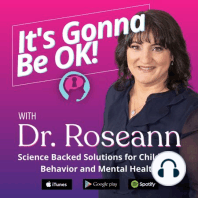4 min listen

117: Ways to Improve Communication With Your Child or Teen - Part 1
FromScience Backed Solutions for Children’s Behavior and Mental Health
117: Ways to Improve Communication With Your Child or Teen - Part 1
FromScience Backed Solutions for Children’s Behavior and Mental Health
ratings:
Length:
12 minutes
Released:
Sep 15, 2023
Format:
Podcast episode
Description
Due to the overreliance on technology, the communication skills of many people have taken a bad turn. This shift gave rise to the excessive use of shortcuts and emojis, and led to a massive decline in traditional communication skills, further impeding the development of essential interpersonal skills such as active listening, empathetic understanding, and non-verbal communication cues.This episode is the first part of Ways to Improve Communication With Your Child or Teen and we will be focusing on the great strategies that parents can use to foster a better and healthier parent-child relationship. Practice active listening.In my previous episode, I’ve emphasized that one of the prevalent mistakes that parents commit is failing to engage in active listening when communicating with their children. If you want to be a good active listener, you can give reassuring responses that indicate that you’re listening to whatever your child is telling you. Active listening is all about being fully present and engaged when communicating with your child. And nowadays, I don’t think that we do enough active listening considering that we tend to lose our patience easily. As a result, parents find themselves struggling to maintain their patience with the amount of pressure from work and other responsibilities. Even when your child is upset or extremely angry at you, you want to be as physically present as possible. Also make sure that your body language and way of speaking with them are proper. We always have to take into consideration the fact that our kids are still developing and they don't always have the right communication skills. Recognizing the significance of active listening and making a conscious effort to practice it is essential in building strong parent-child relationships. That’s why we have to hold ourselves responsible for meeting them where they’re at.Avoid critical language.Oftentimes, there’s miscommunication between parents and their children rooted in the difference between what parents intend to convey and how their messages are actually perceived by their children. Some of the reasons behind this is because of the generational gap and differences in communication styles. It is thus crucial for parents to not only recognize the potential sources of miscommunication but also actively strive to bridge these gaps. This can involve cultivating empathy for their children's perspectives and adjusting their communication style to align with their children's preferences and behaviors.Moreover, our brain is wired to see the negative more than the positive. That is why we often think that we are helping our kids when we point out their mistakes every single time when in fact, we’re doing the opposite. We must therefore avoid using critical language. Instead, we can try pointing out what they’re doing and try to model it in a way that we want them to do it. As parents, we should never invalidate the feelings of our children. Personally, I love getting validated especially during hard times as it is undeniably comforting and uplifting. Validation provides us with a sense of acknowledgment and assurance that our emotions and experiences are valid and worthy of consideration.How to set boundaries.We must observe boundaries and set up clear expectations but the sad truth is that most people are terrible boundary setters. These boundaries serve as essential guides for maintaining healthy and respectful interactions.This requires a deep understanding of one's own needs and limits, as well as the assertiveness to communicate those boundaries to others. It is imperative to promote and prioritize boundaries and self-awareness. By acknowledging this challenge and working towards improving our ability to establish and respect boundaries, we get to foster more respectful and harmonious...
Released:
Sep 15, 2023
Format:
Podcast episode
Titles in the series (100)
It's Gonna Be Ok! by Science Backed Solutions for Children’s Behavior and Mental Health